#Free Ocalan
Text
DECOLONIAL ACTION READING
I recently compiled these to add to a comrade’s post about Land Back, but actually I think they deserve their own post as well.
Amílcar Cabral - Return To The Source
Frantz Fanon - The Wretched Of The Earth
Hô Chí Minh - archive via Marxists.org
Thomas King - The Inconvenient Indian
Abdullah Öcalan - Women’s Revolution & Democratic Confederalism
Edward Said - The Question Of Palestine
Thomas Sankara - archive via Marxists.org
Eve Tuck & K. Wayne Yang - Decolonization Is Not A Metaphor
Other key names in postcolonial theory and its practical application include:
Sara Ahmed
Homi K. Bhabha
Aimé Césaire
Albert Memmi
Jean-Paul Sartre
Léopold Séder Senghor
Gayatri Chakravorty Spivak
All of these will help you interpret and confront the realities of colonisation, and ideally help us understand and extend solidarity to comrades around the globe. Decolonise your mind, and don't stop there!
#land back#postcolonial#postcolonialism#postcolonial theory#decolonization#decolonize#decolonise#decolonisation#Edward Said#Tuck & Yang#Frantz Fanon#Amilcar Cabral#Free Ocalan#Sankara#Ho Chi Minh#Thomas Sankara#Abdullah Ocalan#original#Thomas King#Eve Tuck#K. Wayne Yang
2K notes
·
View notes
Text
Having never actually gotten around to finishing any of Ocalan himself's texts, despite being extremely interested in the Rojava Revolution, I have today discovered just how insane the man is about Jews, and the rabbit hole keeps going.
I've always felt a little uneasy about the way he's revered by a revolutionary movement that otherwise spurns hierarchy and cults of personality. The justification Graeber always gave for it was that Ocalan is in prison for life, thus he can never have any real power, and is treated like the martyrs (the only other revolutionaries whose portraits you'll find decorating the automomous region). The issue with this is that it depends upon Ocalan being imprisoned until his death, something that can't be squared with the popularity of the decades-running campaign to free him as the ideological leader of the Kurdish liberation movement. There's an undeniable tension between a revolution that aims to organise every aspect of society from the bottom up, and an ideological leader (no matter how symbolic) whose image is in nearly every public space. As such I've always hoped a little that the revolution would expand beyond the personality and writings of Ocalan, and finding out about his antisemitsm only strengthens that opinion. I think most of the useful aspects of Ocalan's theory are fleshed out better by Murray Bookchin, whose ideas Ocalan seems to have blended with his own Marxist-Leninist background (to their detriment).
8 notes
·
View notes
Text
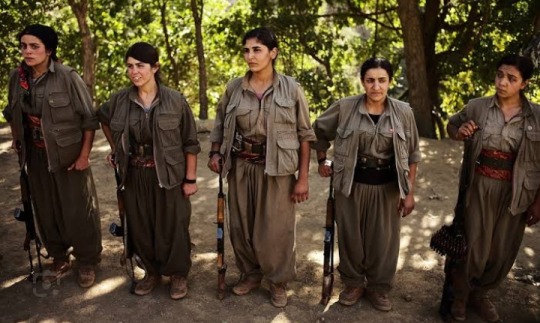
PKK is not a terrorist group. Turkey should stop profiling of Kurdish freedom fighters and free political prisoners like Abdullah Ocalan and Sellahatin Demirtas. PKK successfully fought ISIL and proved they are dependable. Erdogan and his government should stop the propaganda.
5 notes
·
View notes
Text
Why is the world ignoring the revolutionary Kurds in Syria?
Why is the world ignoring the revolutionary Kurds in Syria?
Amid the Syrian warzone a democratic experiment is being stamped into the ground by Isis. That the wider world is unaware is a scandal
In 1937, my father volunteered to fight in the International Brigades in defence of the Spanish Republic. A would-be fascist coup had been temporarily halted by a worker’s uprising, spearheaded by anarchists and socialists, and in much of Spain a genuine social revolution ensued, leading to whole cities under directly democratic management, industries under worker control, and the radical empowerment of women.
Spanish revolutionaries hoped to create a vision of a free society that the entire world might follow. Instead, world powers declared a policy of “non-intervention” and maintained a rigorous blockade on the republic, even after Hitler and Mussolini, ostensible signatories, began pouring in troops and weapons to reinforce the fascist side. The result was years of civil war that ended with the suppression of the revolution and some of a bloody century’s bloodiest massacres.
I never thought I would, in my own lifetime, see the same thing happen again. Obviously, no historical event ever really happens twice. There are a thousand differences between what happened in Spain in 1936 and what is happening in Rojava, the three largely Kurdish provinces of northern Syria, today. But some of the similarities are so striking, and so distressing, that I feel it’s incumbent on me, as someone who grew up in a family whose politics were in many ways defined by the Spanish revolution, to say: we cannot let it end the same way again.
The autonomous region of Rojava, as it exists today, is one of few bright spots – albeit a very bright one – to emerge from the tragedy of the Syrian revolution. Having driven out agents of the Assad regime in 2011, and despite the hostility of almost all of its neighbours, Rojava has not only maintained its independence, but is a remarkable democratic experiment. Popular assemblies have been created as the ultimate decision-making bodies, councils selected with careful ethnic balance (in each municipality, for instance, the top three officers have to include one Kurd, one Arab and one Assyrian or Armenian Christian, and at least one of the three has to be a woman), there are women’s and youth councils, and, in a remarkable echo of the armed Mujeres Libres (Free Women) of Spain, a feminist army, the “YJA Star” militia (the “Union of Free Women”, the star here referring to the ancient Mesopotamian goddess Ishtar), that has carried out a large proportion of the combat operations against the forces of Islamic State.
How can something like this happen and still be almost entirely ignored by the international community, even, largely, by the International left? Mainly, it seems, because the Rojavan revolutionary party, the PYD, works in alliance with Turkey’s Kurdish Worker’s Party (PKK), a Marxist guerilla movement that has since the 1970s been engaged in a long war against the Turkish state. Nato, the US and EU officially classify them as a “terrorist” organisation. Meanwhile, leftists largely write them off as Stalinists.
But, in fact, the PKK itself is no longer anything remotely like the old, top-down Leninist party it once was. Its own internal evolution, and the intellectual conversion of its own founder, Abdullah Ocalan, held in a Turkish island prison since 1999, have led it to entirely change its aims and tactics.
The PKK has declared that it no longer even seeks to create a Kurdish state. Instead, inspired in part by the vision of social ecologist and anarchist Murray Bookchin, it has adopted the vision of “libertarian municipalism”, calling for Kurds to create free, self-governing communities, based on principles of direct democracy, that would then come together across national borders – that it is hoped would over time become increasingly meaningless. In this way, they proposed, the Kurdish struggle could become a model for a wordwide movement towards genuine democracy, co-operative economy, and the gradual dissolution of the bureaucratic nation-state.
Since 2005 the PKK, inspired by the strategy of the Zapatista rebels in Chiapas, declared a unilateral ceasefire with the Turkish state and began concentrating their efforts in developing democratic structures in the territories they already controlled. Some have questioned how serious all this really is. Clearly, authoritarian elements remain. But what has happened in Rojava, where the Syrian revolution gave Kurdish radicals the chance to carry out such experiments in a large, contiguous territory, suggests this is anything but window dressing. Councils, assemblies and popular militias have been formed, regime property has been turned over to worker-managed co-operatives – and all despite continual attacks by the extreme rightwing forces of Isis. The results meet any definition of a social revolution. In the Middle East, at least, these efforts have been noticed: particularly after PKK and Rojava forces intervened to successfully fight their way through Isis territory in Iraq to rescue thousands of Yezidi refugees trapped on Mount Sinjar after the local peshmerga fled the field. These actions were widely celebrated in the region, but remarkably received almost no notice in the European or North American press.
Now, Isis has returned, with scores of US-made tanks and heavy artillery taken from Iraqi forces, to take revenge against many of those same revolutionary militias in Kobane, declaring their intention to massacre and enslave – yes, literally enslave – the entire civilian population. Meanwhile, the Turkish army stands at the border preventing reinforcements or ammunition from reaching the defenders, and US planes buzz overhead making occasional, symbolic, pinprick strikes – apparently, just to be able to say that it did not do nothing as a group it claims to be at war with crushes defenders of one of the world’s great democratic experiments.
If there is a parallel today to Franco’s superficially devout, murderous Falangists, who would it be but Isis? If there is a parallel to the Mujeres Libres of Spain, who could it be but the courageous women defending the barricades in Kobane? Is the world – and this time most scandalously of all, the international left – really going to be complicit in letting history repeat itself?
2 notes
·
View notes
Photo

#CorpMedia #Idiocracy #Oligarchs #MegaBanks vs #Union #Occupy #NoDAPL #BLM #SDF #DACA #MeToo #Humanity #DemExit #FeelTheBern
The Autonomous Administration of North and East Syria [UPDATES]
https://www.syriandemocraticcouncil.us/1418-2/
The Autonomous Administration of North and East Syria (AANES) was established at the Third Conference of the Syrian Democratic Council (SDC) on July 16, 2018 in the city of Al Tabqa. This resolution was approved with the consent of all 300 representatives who were selected from their people throughout the regions of the AANES...

RELATED UPDATE: Official Website of the AANES
https://aanesgov.org/

RELATED UPDATE: RADICAL GUIDE - Autonomous Administration of North and East Syria
https://www.radical-guide.com/listing/autonomous-administration-of-north-and-east-syria/

RELATED UPDATE: Rojava: Key Facts
https://rojavainformationcenter.com/background/key-facts/

RELATED UPDATE: How to Preserve the Autonomy of Northeast Syria
https://www.washingtoninstitute.org/policy-analysis/how-preserve-autonomy-northeast-syria
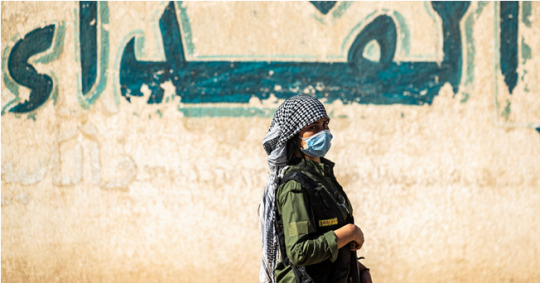
RELATED UPDATE: Why the AANES is the best interim option for local communities in northeastern Syria
https://www.mei.edu/publications/why-aanes-best-interim-option-local-communities-northeastern-syria

RELATED UPDATE: AANES calls for international action on the fifth anniversary of the occupation of Afrin
https://anfenglish.com/rojava-syria/aanes-calls-for-international-action-on-the-fifth-anniversary-of-the-occupation-of-afrin-66117
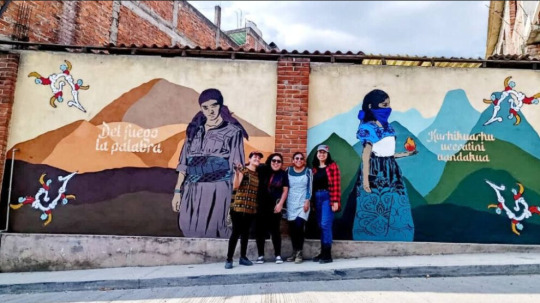
RELATED UPDATE: Women of Cherán present 0calan with mural
https://anfenglish.com/news/women-of-cheran-presents-Ocalan-with-mural-66427

RELATED UPDATE: AANES delegation visits French Senate
https://anfenglish.com/news/aanes-delegation-visits-french-senate-66244
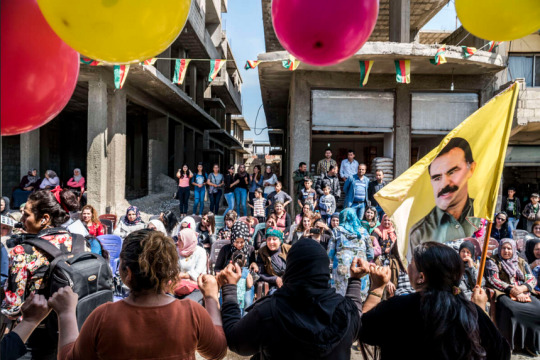
RELATED UPDATE: “Woman, Life, Freedom”: Syrian Women Are Rising Up Against Patriarchy
https://truthout.org/articles/woman-life-freedom-syrian-women-are-rising-up-against-patriarchy/

RELATED UPDATE: French delegation praises AANES model
https://hawarnews.com/en/haber/french-delegation-praises-aanes-model-h35812.html

RELATED UPDATE: Trees planted in Rojava to mark 0calan’s birthday
https://anfenglish.com/rojava-syria/trees-planted-in-rojava-to-mark-Ocalan-s-birthday-66402

RELATED UPDATE: AANES inaugurates largest university construction project in NE, Syria
https://www.hawarnews.com/en/haber/aanes-inaugurates-largest-university-construction-project-in-ne-syria-h35843.html

RELATED UPDATE: Voters support the Green Left Party
https://anfenglishmobile.com/features/voters-support-green-left-party-66443
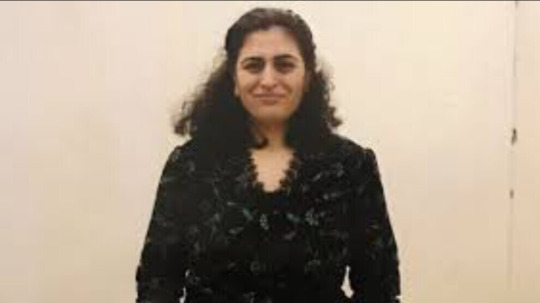
RELATED UPDATE: Sebahat Tuncel: We will build our life
https://anfenglishmobile.com/news/sebahat-tuncel-we-will-build-our-life-66444

RELATED UPDATE: Catalonia to introduce resolution to deal directly with the AANES
https://npasyria.com/en/95934/
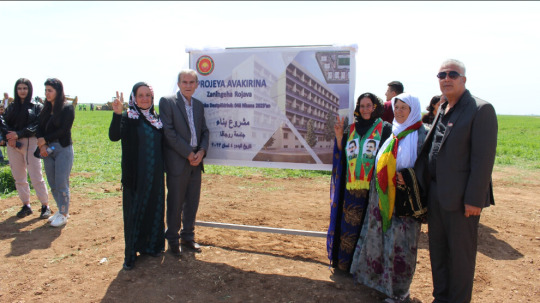
RELATED UPDATE: Autonomous Administration of North-East Syria discloses new project to build a new univerisity
https://anfenglish.com/rojava-syria/autonomous-administration-discloses-new-project-to-build-new-univerisity-66447

RELATED UPDATE: AANES's Health Body discusses ways of cooperation with Catalan Parliament
https://hawarnews.com/en/haber/aaness-health-body-discusses-ways-of-cooperation-with-catalan-parliament-h35849.html
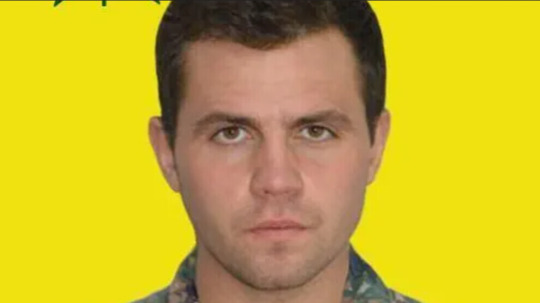
RELATED UPDATE: Internationalist martyrs of the Rojava Revolution – VII: British Kemal
https://anfenglishmobile.com/features/internationalist-martyrs-of-the-rojava-revolution-vii-british-kemal-66456

RELATED UPDATE: AANES: Moscow Quadripartite Meeting is waste of time, losing bet
https://www.hawarnews.com/en/haber/aanes-moscow-quadripartite-meeting-is-waste-of-time-losing-bet-h35851.html
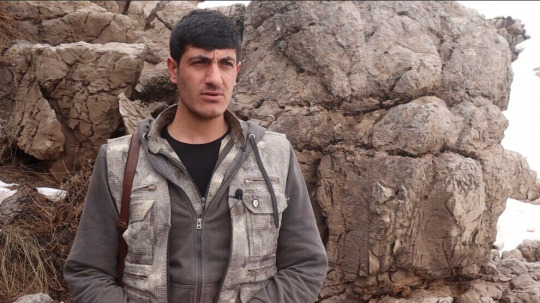
RELATED UPDATE: Guerrilla Gabar: 0calan stands for all peoples who seek a free life
https://anfenglishmobile.com/kurdistan/guerrilla-gabar-Ocalan-stands-for-all-peoples-who-seek-a-free-life-66457
2 notes
·
View notes
Text
BlogPost #8
Magnum Photos is an international co-operative with the aim of freeing the photographers from the hook of magazines. Prior to this co-operative, photographers had to work for magazines on assignments that they did not choose and take pictures that they would not ultimately own. The founders, Robert Capa, David "Chim" Seymour, Maria Eisner, Henri Cartier-Bresson, George Rodger, William Vandivert, and Rita Vandivertenvisioned a future where they could work freely, owning their own photos and covering what matters to them and still sell printing rights to interested magazines. Magnum Photos was essentially a balance between photojournalistic ideals and economic incentives.
This co-operative came to fruition in 1947, with an office in New York and one in Paris. Photographers take photos, store them in the co-operative catalog where publishing rights are sold to magazines such as “Life”, “Paris Match”, etc. and the photographer would continue their work on their next project. The higher flexibility of this model allowed wide coverage over of events across the whole world in an age where a photograph was a magical portal to a distant far away land. It is worth considering if the same influence still exists in the Internet era, and if not, what would a modern influential rendition of Magnum Photos look like.
For my photographer, I chose Newsha Tavakolian, an Iranian Photographer that has worked with the Time magazine, The New York Times, National Geographic, etc. Her main focus is on women’s issues and presenting a real and personal view of Iran, intended for the Iranian audience. It is a bold move to cover such events in Iran. You are not celebrated by your country or protected by law. In fact, she has been banned from working in Iran from 2019. She is courageous, like Boogie, but she is also an Iranian like me, subject to the same (and possibly more) restrictions that I was subject to. This is why she inspires me.
The first two artworks are from “Listen: Giving voice to Iranian Women”. Iranian women cannot legally sing in Iran unless as background vocals or for an all-female audience. Newsha Tavakolian imagines what CD covers would look like for women singers. All photos share a lonely struggle with fate in them. The three following pieces are of “Blank Pages of an Iranian Photo Album”. The intention is to follow the modern culture and middle-class life of a post-revolution Iran. The final two pieces is of her covering YPJ, Women’s Protection Units, an all-female militia in Syria.
I do wonder, if what I see in Newsha’s photos are also what a Western native, such as those born in the USA see. Do they see an artistic beauty, an oppressed message or a personal take on Iranian life? I, for what it’s worth, cannot help but see oppression and a will to endure, evolve and fight in every photo.

Imaginary CD cover for Ghazal
By Newsha Tavakolian
From "Listen: Giving voice to Iranian Women"
Location: Tehran, Iran
Year: 2011

Portrait of Azita Akhavan
By Newsha Tavakolian
From "Listen: Giving voice to Iranian Women"
Location: Tehran, Iran
Year: 2010

Mahud, climbing the wall of the abandoned empty swimming pool, which is the only quiet place he can find to practice his singing
By Newsha Tavakolian
From "Blank Pages of an Iranian Photo Album"
Location: Tehran, Iran
Year: 2014

A large drawing of a woman without Islamic covering hidden behind a large sheet of white paper, as a girl tries to sneak a peek
By Newsha Tavakolian
From "Blank Pages of an Iranian Photo Album"
Location: Tehran, Iran
Year: 2014
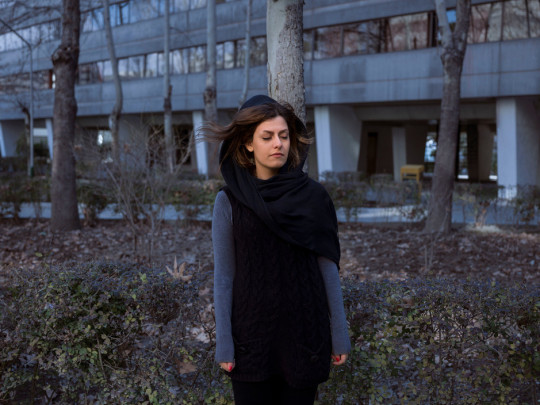
Portrait of Sanaz in front of her apartment block in Ekbatan
By Newsha Tavakolian
From "Blank Pages of an Iranian Photo Album"
Location: Tehran, Iran
Year: 2012

Torin Khairegi, 18, in Zinar base
By Newsha Tavakolian
From "Ocalan's Angels"
Location: Semalka Border, Rojava, Syria.
Year: 2015
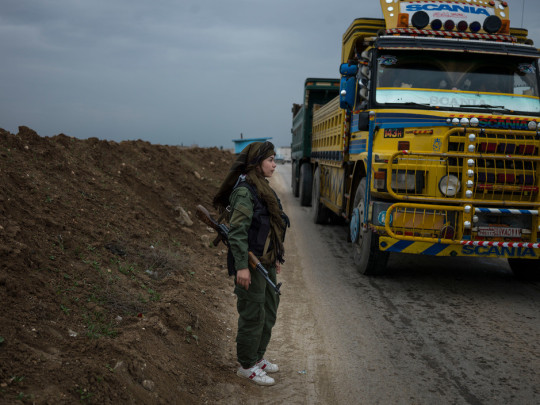
YPJ soldiers at the checkpoint, where identity of the passengers is monitored, as a precautionary measure to prevent any infiltration by ISIS members
By Newsha Tavakolian
From "Ocalan's Angels"
Location: Amuda, Rojava, Syria.
Year: 2015
0 notes
Text
@expatiating
>Literally anyone who lived in a communist or socialist regime: it was terrible..... 16 year old white girl on tumblr: yeah but that wasn’t real communism :///
You mean anyone like this, you stupid fucking asshole?
Oppressive and grey? No, growing up under communism was the happiest time of my life
When people ask me what it was like growing up behind the Iron Curtain in Hungary in the Seventies and Eighties, most expect to hear tales of secret police, bread queues and other nasty manifestations of life in a one-party state.
They are invariably disappointed when I explain that the reality was quite different, and communist Hungary, far from being hell on earth, was in fact, rather a fun place to live.
The communists provided everyone with guaranteed employment, good education and free healthcare. Violent crime was virtually non-existent.
But perhaps the best thing of all was the overriding sense of camaraderie, a spirit lacking in my adopted Britain and, indeed, whenever I go back to Hungary today. People trusted one another, and what we had we shared.
youtube
Learn from Cuba, Says World Bank
The island's economy, which suffered devastating losses in production after the Soviet Union withdrew its aid, especially its oil supplies, a decade ago, has yet to fully recover. Annual economic growth, fuelled in part by a growing tourism industry and limited foreign investment, has been halting and, for the most part, anaemic.
Moreover, its economic policies are generally anathema to the Bank. The government controls virtually the entire economy, permitting private entrepreneurs the tiniest of spaces. It heavily subsidises virtually all staples and commodities; its currency is not convertible to anything. It retains tight control over all foreign investment, and often changes the rules abruptly and for political reasons.
At the same time, however, its record of social achievement has not only been sustained; it's been enhanced, according to the WDI.
It has reduced its infant mortality rate from 11 per 1,000 births in 1990 to seven in 1999, which places it firmly in the ranks of the western industrialised nations. It now stands at six, according to Jo Ritzen, the Bank's Vice President for Development Policy who visited Cuba privately several months ago to see for himself.
By comparison, the infant mortality rate for Argentina stood at 18 in 1999; Chile's was down to ten; and Costa Rica, 12. For the entire Latin American and Caribbean region as a whole, the average was 30 in 1999.
Similarly, the mortality rate for children under five in Cuba has fallen from 13 to eight per thousand over the decade. That figure is 50 percent lower than the rate in Chile, the Latin American country closest to Cuba's achievement. For the region as a whole, the average was 38 in 1999.
"Six for every 1,000 in infant mortality - the same level as Spain - is just unbelievable," according to Ritzen, a former education minister in the Netherlands. "You observe it, and so you see that Cuba has done exceedingly well in the human development area."
Indeed, in Ritzen's own field the figures tell much the same story. Net primary enrolment for both girls and boys reached 100 percent in 1997, up from 92 percent in 1990. That was as high as most developed nations, higher even than the US rate and well above 80-90 percent rates achieved by the most advanced Latin American countries.
"Even in education performance, Cuba's is very much in tune with the developed world, and much higher than schools in, say, Argentina, Brazil, or Chile."
It is no wonder, in some ways. Public spending on education in Cuba amounts to about 6.7 percent of gross national income, twice the proportion in other Latin America and Caribbean countries and even Singapore.
There were 12 primary pupils for every Cuban teacher in 1997, a ratio that ranked with Sweden, rather than any other developing country. The Latin American and East Asian average was twice as high at 25 to one.
The average youth (ages 15-24) illiteracy rate in Latin America and the Caribbean stands at seven percent. In Cuba, the rate is zero. In Latin America, where the average is seven percent, only Uruguay approaches that achievement, with one percent youth illiteracy.
"Cuba managed to reduce illiteracy from 40 percent to zero within ten years," said Ritzen. "If Cuba shows that it is possible, it shifts the burden of proof to those who say it's not possible."
Similarly, Cuba devoted 9.1 percent of its gross domestic product (GDP) during the 1990s to health care, roughly equivalent to Canada's rate. Its ratio of 5.3 doctors per 1,000 people was the highest in the world.
The question that these statistics pose, of course, is whether the Cuban experience can be replicated. The answer given here is probably not.
"What does it is the incredible dedication," according to Wayne Smith, who was head of the US Interests Section in Havana in the late 1970s and early 1980s and has travelled to the island many times since. "Doctors in Cuba can make more driving cabs and working in hotels, but they don't. They're just very dedicated," he said.
youtube
This amazing video and documentary, produced by Neighbor Democracy, details the evolving communal organs within the Rojava Revolution, from security to health care.
This 40 minute video is an in-depth look into the inner workings of the commune system of Rojava and how they work in practice. Rojava is the colloquial name for the Democratic Federation of Northern Syria (DFNS), a multi-ethnic, pluralist, women’s liberationist, and radically democratic autonomous zone that has grown out of the context of the Syrian Civil War. While there is frequent and thorough reporting on the military aspects of the Revolution in Rojava, especially their fight against Daesh (ISIS) and the Turkish State, the social revolution as it relates to the everyday lives of the people living there is rarely given anything more than a cursory overview, even in radical circles.
This video is one attempt to make up for that gap in easily digestible information about the way the day-to-day autonomous organizing affects daily life in Rojava. It also closes with a call for people in the US and elsewhere to build communes along similar lines, while discussing some possible contextual considerations specific to North America.
The communes in the DFNS are birthed out of tireless organizing by everyday people, predominately Kurdish women, in an effort that started clandestinely in the days of the Regime, but has since led to structures that could fill the power vacuum left in the war. The people of the DFNS are working out in practice through trial-and-error the culmination of 40 years of theoretical and practical knowledge built through the Kurdish struggle, and most thoroughly laid out by the imprisoned PKK leader, Abdullah Ocalan.
The communes have many similarities to the neighborhood assemblies that were the focus of the late American communalist Murray Bookchin, who was an inspiration for Ocalan. There are an estimated 4,000 communes in Rojava today, run through direct democracy of all the residents (50-150 families). The work of the commune is divided up into committees which anyone can join. The most common committees are explored in-depth in this video, and their timestamps can be found below. Each committee covered in the video can be found in its own short clip on the Neighbor Democracy channel so that these short, easy-to-digest videos can me shared in discussions about specific topics relating to communal approaches to various aspects of life.
Marinaleda: Will 'free homes' solve Spain's evictions crisis?
In the wake of Spain's property crash, hundreds of thousands of homes have been repossessed. While one regional government says it will seize repossessed properties from the banks, a little town is doing away with mortgages altogether.
In Marinaleda, residents like 42-year-old father-of-three, David Gonzalez Molina, are building their own homes.
While he burrows with a pneumatic drill into the earth, David nonchalantly says it "should take a couple of years".
However, when his new house is finished he will have paid "absolutely nothing".
Free bricks and mortar
The town hall in this small, aesthetically unremarkable town an hour-and-a-bit east of Seville, has given David 190 sq m (2,000 sq ft) of land.
He and others are only eligible after they have been registered residents of Marinaleda for at least two years.
The bricks and mortar are also a gift, this time from the regional government of Andalusia.
Only once his home is finished will he start paying 15 euros (£13) a month, to the regional government, to refund the cost of other building materials.
Of course, most people do not know how to build a house, so the town hall in Marinaleda throws in some expertise.
It employs several professional builders and plumbers, a couple of whom work alongside David, to help him construct his house.
HOMAGE TO CATALONIA
This was in late December 1936, less than seven months ago as I write, and yet it is a period that has already receded into enormous distance. Later events have obliterated it much more completely than they have obliterated 1935, or 1905, for that matter. I had come to Spain with some notion of writing newspaper articles, but I had joined the militia almost immediately, because at that time and in that atmosphere it seemed the only conceivable thing to do. The Anarchists were still in virtual control of Catalonia and the revolution was still in full swing. To anyone who had been there since the beginning it probably seemed even in December or January that the revolutionary period was ending; but when one came straight from England the aspect of Barcelona was something startling and overwhelming. It was the first time that I had ever been in a town where the working class was in the saddle. Practically every building of any size had been seized by the workers and was draped with red flags or with the red and black flag of the Anarchists; every wall was scrawled with the hammer and sickle and with the initials of the revolutionary parties; almost every church had been gutted and its images burnt. Churches here and there were being systematically demolished by gangs of workmen. Every shop and café had an inscription saying that it had been collectivized; even the bootblacks had been collectivized and their boxes painted red and black. Waiters and shop-walkers looked you in the face and treated you as an equal. Servile and even ceremonial forms of speech had temporarily disappeared. Nobody said ‘Señior’ or ‘Don’ or even ‘Usted’; everyone called everyone else ‘Comrade’ and ‘Thou’, and said ‘Salud!’ instead of ‘Buenos dias’. Tipping was forbidden by law; almost my first experience was receiving a lecture from a hotel manager for trying to tip a lift-boy. There were no private motor-cars, they had all been commandeered, and all the trams and taxis and much of the other transport were painted red and black. The revolutionary posters were everywhere, flaming from the walls in clean reds and blues that made the few remaining advertisements look like daubs of mud. Down the Ramblas, the wide central artery of the town where crowds of people streamed constantly to and fro, the loudspeakers were bellowing revolutionary songs all day and far into the night. And it was the aspect of the crowds that was the queerest thing of all. In outward appearance it was a town in which the wealthy classes had practically ceased to exist. Except for a small number of women and foreigners there were no ‘well-dressed�� people at all. Practically everyone wore rough working-class clothes, or blue overalls, or some variant of the militia uniform. All this was queer and moving. There was much in it that I did not understand, in some ways I did not even like it, but I recognized it immediately as a state of affairs worth fighting for. Also I believed that things were as they appeared, that this was really a workers' State and that the entire bourgeoisie had either fled, been killed, or voluntarily come over to the workers' side; I did not realize that great numbers of well-to-do bourgeois were simply lying low and disguising themselves as proletarians for the time being.
Together with all this there was something of the evil atmosphere of war. The town had a gaunt untidy look, roads and buildings were in poor repair, the streets at night were dimly lit for fear of air-raids, the shops were mostly shabby and half-empty. Meat was scarce and milk practically unobtainable, there was a shortage of coal, sugar, and petrol, and a really serious shortage of bread. Even at this period the bread-queues were often hundreds of yards long. Yet so far as one could judge the people were contented and hopeful. There was no unemployment, and the price of living was still extremely low; you saw very few conspicuously destitute people, and no beggars except the gipsies. Above all, there was a belief in the revolution and the future, a feeling of having suddenly emerged into an era of equality and freedom. Human beings were trying to behave as human beings and not as cogs in the capitalist machine. In the barbers' shops were Anarchist notices (the barbers were mostly Anarchists) solemnly explaining that barbers were no longer slaves. In the streets were coloured posters appealing to prostitutes to stop being prostitutes. To anyone from the hard-boiled, sneering civilization of the English-speaking races there was something rather pathetic in the literalness with which these idealistic Spaniards took the hackneyed phrases of revolution. At that time revolutionary ballads of the naivest kind, all about proletarian brotherhood and the wickedness of Mussolini, were being sold on the streets for a few centimes each. I have often seen an illiterate militiaman buy one of these ballads, laboriously spell out the words, and then, when he had got the hang of it, begin singing it to an appropriate tune.
youtube
Feel free to unfuck yourself you class cuck.
19 notes
·
View notes
Link
"For Bookchin, hierarchy’s legacy of domination is countered by a longstanding legacy of freedom—resistance movements throughout history that have embodied principles from organic society—usufruct (use of resources as needed), complementarity (ethical mutuality) and the irreducible minimum (the right of all to food, shelter, and clothing). The potential still remains for a dialectical transcendence of domination in a free cooperative society that could make possible a cooperative relationship with nature. He called this set of ideas 'social ecology'.
In 'Urbanization Without Cities', he sought to establish the historical foundations for assembly democracy. He found a tradition of citizens’ assemblies - especially in the ancient Athenian ecclesia; in early towns of Italy and Germany and the Low countries; in the Russian veche of Pskov and Novgorod; in the comuñero assemblies of sixteenth-century Spain; in the assemblies of the revolutionary Parisian sections of 1793; the committees and councils of the American revolution; the Parisian clubs of 1848; in the Paris Commune of 1871; the soviets of 1905 and 1917; the collectives of revolutionary Spain in 1936-37; and the New England town meeting today, among others. He showed how (contrary to Marxism) the venue for revolution was not the factory but the municipality. Urbanization laid out the dialectical foundations for a municipalist revolt for freedom against the nation-state."
-Janet Biehl
2 notes
·
View notes
Text
Sono curdo e questo è un grave problema. Un'intervista a Erol Aydemir
02 AGOSTO 2019 |IN CONFLITTI GLOBALI.
Stampa
2242
Riceviamo e pubblichiamo un'itervista che ci ha inviato una compagna a Erol Aydemir, rifugiato curdo, tra i militanti e le militanti che hanno aderito allo sciopero della fame iniziato qualche mese fa contro l'isolamento in cui lo stato turco costringe Abdullah Ocalan da vent'anni nell'isola prigione di Imrali.
Sono curdo e questo è un grave problema. Un'intervista a Erol Aydemir
Sembra quasi impossibile cambiare qualcosa a questo mondo, è più facile voltarsi e continuare la propria vita. La guerra infastidisce, annoia, sposta l’attenzione dal futile all’essenziale, ci costringe ad aprire, a ricordare, ci responsabilizza, perché siamo tutti responsabili, siamo l’insieme di un qualcosa, e in quanto tali, potenzialmente capaci di modificare gli eventi o quantomeno provarci.
Un altro movens al mio interesse è che la guerra arriva all’improvviso, non ti avverte, e anche quando lo fa, quando i governi iniziano a vacillare, quando al potere arrivano i tiranni, gli avidi, i ciarlatani, i dittatori, il peggio del peggio di questo mondo, quando si creano fazioni, è troppo tardi per reagire. Gli storici ci dicono che siamo una specie ancora troppo fragile evolutivamente per evitare che inizino a girare quegli ingranaggi che ci porteranno ad altre politiche depredatorie, occupazioni, stermini, guerre.
Ho deciso di intervistare Erol dietro la precisa richiesta di una combattente curda delle YPJ, ora martire ventenne, rivolta a noi donne occidentali.
Mi interessa, perché se fossi disperata nulla mi getterebbe ancora più nello sconforto che non essere ascoltata.
Erol Aydemir, 30 anni Curdo, in italia da cinque anni, una vita bloccata in attesa di riprendere i suoi studi all’università di Cagliari, imprigionato dal regime di Erdogan per due anni perchè trovato in possesso di alcuni libri del suo leader politico Abdullah Ocalan, e ora rifugiato politico in Italia, in attesa di riprendere il suo percorso di laurea.
Come lui altri milioni di giovani della nostra generazione a cui si aggiungono i milioni di bambini e adolescenti interessati dai conflitti in medio-oriente che vanno avanti da oltre due generazioni con picchi di acutizzazione, lente riprese, e di nuovo repentine ricadute. Città distrutte, rase al suolo, ci abituiamo a tutto, ci abituiamo all’assurdo.
Una delle parti che più mi ha colpita, in quanto ossessionata dall’idea che a questo mondo si possano attuare modelli di cambiamento sociali che vedono al centro le relazioni umane e in definitiva quelle tra i generi, la posizione di Abdullah Ocalan in merito alla questione femminile, e non farò altro che citarlo :
“Nessuna bruttezza può essere disonorevole e disgustosa come unirsi e integrarsi con donne schiave e uomini dominanti.
Nessuna unità e integrità potrebbe essere bella e giusta come vivere una vita libera con donne libere e mascolinità liberata dal dominio.
Ormai da 30 anni tutti i miei sostenitori più importanti sono donne.
Il mio dialogo e accordo con le donne è importante.
Migliorerete il contratto sociale delle donne che deve combattere tutti i tipi di pratiche dal femminicidio alla circoncisione femminile e allo stupro.
Va affrontato in modo approfondito.
Non fidatevi degli uomini e distruggete il dogma maschile.
Fidatevi della vostra femminilità.
Uguaglianza e libertà possono essere ottenute solo a partire dalla questione femminile.
Questa è la ragione del perché la nostra rivoluzione è una rivoluzione delle donne.”
Questo e molto altro, esprimono al meglio il perché ho deciso di ascoltare queste persone.
Un modello sociale definito confederalismo democratico, di stampo dichiaratamente rivoluzionario, femminista, ecosostenibile, che ha al centro l’essere umano e il rispetto dei suoi diritti, teso a liberare i popoli da oppressioni di natura capitalista, nazionalista, politica, religiosa ( quando opprimente e dogmatica ) e patriarcale.
Un modello quasi ancestrale, apparentemente utopico, attuabile solo attraverso una forte determinazione nell’azione rivoluzionaria dei singoli, che è diretta espressione di una volontà collettiva di cambiamento, di trasformazione del reale e delle vite delle persone.
Ed è a te che stai leggendo che mi rivolgo con un sorriso.
Sono stata accolta da Erol al suo settantaduesimo giorno di sciopero della fame condiviso con altre 72.000 persone in vari paesi, rifugiati politici e attivisti del luogo, con lo scopo di ottenere un regime di detenzione affine agli standard internazionali che si basano sul rispetto della dignità del condannato e delle sue necessità. [ Ad oggi, tre mesi dall’intervista è stato raggiunto un semi-compromesso in cui gli è stato permesso di parlare saltuariamente con i suoi parenti e con gli avvocati ].
"Sono curdo e questo è un grave problema, non solo nei confronti del regime dittatoriale del governo turco, ma di tutti i sistemi corrotti del mondo, abbiamo capito bene ciò che vogliamo politicamente, aiutare tutti i popoli, infatti sono stato molto contento che i genovesi abbiano bloccato la nave che avrebbe portato le armi in Yemen, mi hanno dato l’energia per vivere, questa è la nostra visione, unitaria. Allo stesso modo in cui Lorenzo Orsetti è caduto martire in Rojava combattendo l’Isis tra le nostre fila."
Una delle prime cose che mi ha detto in oltre due ore di conversazione davanti agli innumerevoli tè che mi sono stati offerti da un susseguirsi di uomini e ragazzi Curdi e Turchi e Afghani sorridenti è stata "i Curdi fanno una lotta per tutti i popoli, perché c’è un’idea dietro alla difesa di un popolo, combattono per l’unità del popolo della terra."
[ una lotta all’ ISIS, ma per questo vi rimando , così da poter capire bene la situazione geo-politica e i diversi attori operanti nel conflitto in medio oriente e la ripartizione reale delle responsabilità, ma soprattutto i reali interessi economici alla base della guerra attuale a due pubblicazioni: https://www.youtube.com/watch?v=q9s49x_whLw , https://www.infoaut.org/culture/il-fiore-della-rivoluzione
Aggiungo che per una lettura più inerente allo scenario di guerriglia urbana, ma sempre basato su un capitale umano e una motivazione non indifferente, come gli altri autori di cui sopra: http://www.arvultura.it/1845/non-moriro-stanotte-presentazione-libro-di-e-con-karim-franceschi/ ]
Perché dovremmo interessarci al modello del confederalismo democratico?
Perché il modello del confederalismo democratico è prima di tutto un modello umano. Le politiche attuali creano i substrati per sostenere un popolo a discapito di altri popoli, questo non è più accettabile. Questa è una nuova ottica, l’unica possibile.
Se siamo umani dobbiamo proteggere tutti i viventi e l’ambiente.
Dobbiamo curarci dei popoli che sono stati distrutti dalla guerra, perché è quando la guerra finisce che sorgono gli altri problemi, le emergenze umanitarie sono reali. Basta poco per entrare in quest’ottica di auto-aiuto.
[ In merito a questo punto vi invito a seguire le missioni umanitarie operanti sui territori, una che mi ha colplita particolarmente è quella di un gruppo di predicatori critiani, i fortissimi “ Free Burma Rangers “ che se ne vanno in prima linea a recuperare civili intrappolati sotto il fuoco nemico, letteralmente correndo tra il fuoco dei proietili per recuperarli; qui il link del loro intervento a Baghouz, ma ce ne sono veramente molte, da Emergency a MSF passando per attivisti che ciclano intorno ai campi profughi sul territorio Siriano ed Iracheno e che potete trovare anche su Fb nei loro gruppi dedicati
https://www.youtube.com/watch?v=zG_sOW9NvhQ ]
Perché questa necessità di cambiamento nasce nella tua terra?
Sono curdo e questo è un grave problema, viviamo in zone di confine tra Turchia, Iran, Siria ed Iraq da sempre, capisci bene che siamo soggetti come tutti i popoli di confine ad attacchi continui. Non solo nei confronti del regime dittatoriale che combattiamo con il governo turco di Erdogan, abbiamo capito bene ciò che vogliamo, non è uno stato in se che chiediamo, ma la libertà, l’autonomia. Vogliamo aiutare tutti i popoli.
Dimmi quanti popoli si sono uniti per combattere insieme?
Donne e uomini Iracheni, siriani, yezidi, curdi ed internazionalisti italiani, inglesi, americani, tedeschi, spagnoli, dall’Europa del nord e dall’Europa dell’est.
Come possiamo capire il modello del confederalismo democratico?
Pensa ai cantoni del nord Italia, che hanno integrato la loro struttura democratica e autonoma con quella italiana, tedesca e svizzera. Le persone devono essere collettivamente responsabili del territorio in cui vivono, non possono essere soggette ad un ordine superiore, un singolo non può decidere per il futuro di decine, centinaia o milioni di persone. Non possiamo lasciare che una piccola collettività di persone abbia il potere decisionale di sganciare un’altra bomba atomica.
https://it.wikipedia.org/wiki/Confederalismo_democratico
Come siamo implicati noi italiani in queste dinamiche?
Ad esempio se venti anni fa l’ Italia non avesse venduto le armi alla Libia adesso non sarebbero armata, nemmeno i muri ci salveranno dai migranti, nemmeno i sistemi NATO, ma il problema non è l’Italia in se e per se ma il sistema, e dobbiamo unirci contro il sistema, ad esempio se io non avessi sentito il dolore dei bambini di Afrin non avrei fatto questo sciopero della fame.
[ a questo proposito vi rimando :
https://www.osservatoriodiritti.it/2019/01/23/armi-italiane-nel-mondo-arabia-saudita-in-yemen/
https://www.osservatoriodiritti.it/2019/05/15/export-armi-italia-vendita-nel-mondo-paesi/
per informarvi autonomamente, nell’era dei social è veramente molto semplice ]
Quali sono i reali motivi di questa guerra che vi ha messi in ginocchio, cos’è l’Isis?
L’Isis non è una questione religiosa, l’islam non è questo, tanto è vero che sono proprio altri musulmani che hanno combattuto le forze di Daesh, bisogna informarsi, bisogna pensare ai territori e alle materie prime, a chi ha interesse ad averle, siamo tutti intercalati in questo sistema depredatorio, l’unico strumento che abbiamo è l’informazione corretta, di facile appannaggio al giorno d’oggi.
https://www.eticapa.it/eticapa/wp-content/uploads/2015/03/Il-petrolio-e-la-guerra-dellIsis2.pdf
È difficile capire quanto sia perversa la rete che alimenta i conflitti, come possiamo fare a districarci?
Bisogna informarsi, bisogna parlare, bisogna favorire l’informazione corretta, fedele ai fatti, non bisogna stare in silenzio, il sapere è l’unico modo per contrastare i potenti che opprimono i popoli per i loro interessi, bisogna lasciare una traccia per le nuove generazioni.
In questo momento storico è anche semplice, perché le masse smuovono le coscienze tramite i social, bisogna indignarsi, basta un clic e collettivamente possiamo fare molto.
Il silenzio lascia spazio al male, perché non c’è contrasto alla menzogna.
Lotta non è solo imbracciare le armi, lotta è difendere i popoli che cercano la libertà, per questo c’è una bandiera palestinese nella mia camera, io combatto e sciopero anche per loro con tutta la mia forza. Dobbiamo avere un sogno anche per gli altri, dobbiamo arrivare a vivere senza le guerre.
Non possiamo limitarci a chiedere la pace, tutte le persone del mondo desiderano la pace ma bisogna attivarsi per ottenerla.
La guerra è più facile, sterminare le persone per ottenere qualcosa è più facile che chiedere per favore a questo mondo.
2 notes
·
View notes
Text
Solidarity with Rojava! Lecture and interview with Remzi Kartal, co-president of the People’s Congress (Kongra-Gel)
Remzi Kartal visited us and other internationalist and Kurdish comrades here in Finland in January 2019. He spoke about the difficult last year and what we as internationalist supporters can expect and how to support the Rojava Revolution! Here are notes from his lecture, and questions posed to him afterwards.
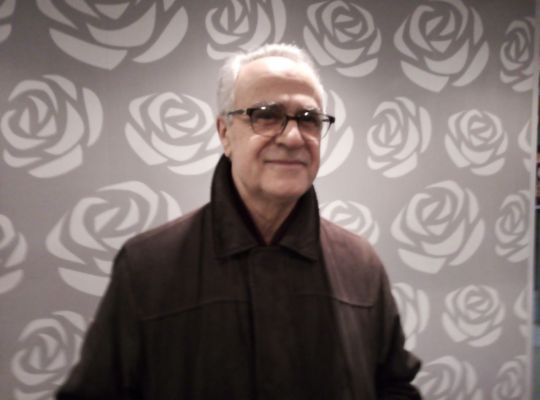
Some words from Remzi on the past year and the new year to come:
The last year was marked by hard times, but following a hard struggle we step in to the new year. Of the last year that has passed (2018), the revolution in Rojava has shown success. It became known in the wider world, and has made Turkey afraid of that revolution. This is what caused Turkey to attack Afrin on 20.1.2018.
The isolation of Ocalan has been stronger and stronger; he has been unable to see his lawyers for 8 years now.
Journalism has been effectively banned in Bakur and Turkey.
Turkey also attacked Basur (Iraqi Kurdistan), the main bases of the movement, occupying areas in Basur as well.
Kurdistan is divided by four nation states, but Turkey has played a more dirty role than the others by infringing on their sovereignty. Fighting the Turkish state is thus fighting for the Kurdish region: Bakur, Basur, Rojava and Rojhelat together.
The actions in solidarity with Afrin by our internationalist comrades, have always been by our side.
Regarding the hunger strikes (Leyla Güven and those in solidarity with hers), one good thing that has come out of this was that it gathered people around, and that has strengthened our struggle. Solidarity with the hunger strike was how the new year started. Thus, our new year began with our struggle against the fascist Turkish state.
As we saw during the time of the siege of Kobane, we saw then the solidarity and positive results of that solidarity. If you want the Rojava struggle and the struggle that started in Bakur to win, and to end the isolation of Öcalan — all of those things — this year we have to start a strong struggle together and in our future fight.
Hungerstrikes and ending Öcalan’s isolation in prison:
All of you internationalists [who are here/who have supported us] are not our friends, but our comrades [hevalno]. If we don’t end fascism of the Turkish state, neither side of the Kurdish region can be stable. Turkey can however attack at any time, and we should be ready for that stage. The basis of Turkish facsim is war, so we have to be ready at all times.
The main focus for us should be to end the isolation of Öcalan. Ending his isolation can open up many things, and in this we need our internationalist comrades.
Leyla Güven is now [at the time of writing] in her 78th day of hunger strike [Leyla has been releasd from Amed prison, but has continued the hunger strike from home]. She can die at any time. As far we know, 225 people (and increasing all the time) in Bakur are also on hunger strike, including HDP MPs, Kurdish mayors, and political prisoners in Turkish prisons. All are calling for the end of the isolation of Öcalan, and for Öcalan to be part of the continuation of the project he started.

According to the hunger strikers, internationalists could be more organised and be ready for any possible action, or reaction, such as the potential of facing martyrdom while on hunger strike. Those on hunger strike are expecting us on the outside to be their voice, especially those of us free and outside of prison. They know the danger of death. What we can do is to make the public more aware, including NGO’s, organisations, media, politically leftist parties (Like in Germany, Sweden). Of course, those are also in control by the capitalist system, that we are aware of. That is why, strategically, our allies are those looking for alternatives, those always in the struggle with us. Like anarchists and anti-authoritanists.
Why do the hunger strikers sacrifice in this way? It is a question to their comrades and is a request to strengthen the struggle.
ISIS is globally dangerous, not just in the Middle East. We know Erdogan is in cooperation with ISIS and other jihadists. The stronger Erdogan is the stronger ISIS is.
Goals of 2019:
The main goal should be to end the isolation of Öcalan. Ending that means an opening to the end Turkish fascism, which in turn means a closer step to a free Kurdistan. In other words, this would open the Kurdish struggle even more. The means towards this goal include pushing the EU Commission to force Turkey to act. Or to push the CPT to visit Imrali prison. How can they be so passive? Isolation clearly equals torture.
This also includes plans and actions like demos, panels, conferences, films, among others. Things that can help awareness and knowledge of the struggle. Things that can bring internationalists and Kurdish comrades together! We also shouldn’t forget that we can wake up and make aware those that don’t want to hear or to listen.
Q and A:
1. Thoughts on US announcing that it will pull out of Syria, Turkey’s offensive plans in Rojava
These actions have shown that Trump has taken economic relations between him and Erdogan as more important. When the news first broke, Syrian Kurds were worried. Would this be another Afrin? The leadership of the Democratic Republic of northern and eastern Syria published their opinion, and this in turn changed the opinion of others - what they said was this: the Rojava Revolution didn’t start because of the US and it won’t end because of it either. The people of Rojava are now starting a new phase. There is still danger of a new Turkish attack, but now is the time for internationalists and Kurds living outside of Rojava to show more solidarity with Rojava.
2. Thoughts on the Turkification and jihadisation of Afrin, and resistance to it
Öcalan’s philosophy is the main basis in northern and eastern Syria. All elements in society in Rojava have been coming closer and making society together based on this philosophy. That is why Turkish fascism becomes afraid, and feels vulnerable. Decades ago, these types of struggles would be limited to the local area one lives in, but now this struggle is all over the world. This is a big anxiety for fascism.
The solution is coming closer because the struggle is being wider and stronger. ‘This more you come closer to the darkness the more the light comes closer to you’. It is difficult to imagine that Turkey wants to occupy the whole of Rojava. It is more probable that an attack from the Turkish side would be in some targeted small areas to test our reaction.
Internationalist comrades should prepare for solidarity of the same kind as when Kobane was attacked by ISIS. The main thing to think about, and also a good reason to become really aware of this revolution, is what the aims are of this revolution (democratic confederalism, feminism, antifascism, ecology) and to bring it to others.
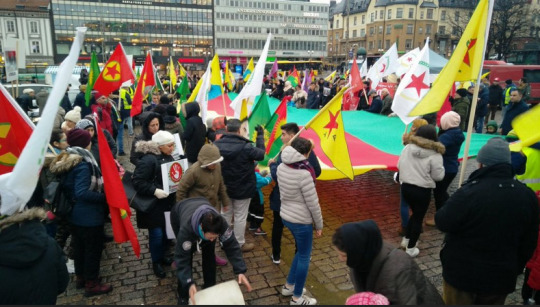
3. What will change (concretely), and what will it lead to, when Öcalan’s isolation is broken?
Breaking isolation does not equal an immediate end of fascism, of course. But if we can break it, it is more motivating to defeat fascism. We will never stop until fascism is gone. Turkey and jihadists have taken over Afrin and are changing its demography deliberately; they are building a small Turkey — Turkish flag, Turkish education, Turkish language, etc. Full assimilation is what they demand, to scare people, and to make many of them leave. However, the people of Afrin are still struggling, still fighting in very appreciated ways. Those who lost their house or village, many are in camps in the Shaaba area, but they continue to work against the occupation. The YPJ/YPG and SDF are still fighting in the same way as guerrillas, and the YPJ/YPG continue their fight for Afrin until the end.
4. You used to be a People’s Party MP in Turkey. What are your thoughts on Turkey then as an MP vs now?
I was elected in 1991 as an MP and left in 1994. Some comrades were fighting in Turkey, and the opportunity came up to leave. I wanted to continue the struggle, and have been in Europe now for 26 years and 4 months. The difference? Action of the government against the people is getting stronger, but on the other hand the struggle from the people is getting wider.
In the context of, for example, the Gezi Park demonstrations in 2013, there are no opportunities for democratic movements or activities at the moment, fascism is taking over. However, we are strongly getting these groups together so we can act in a stronger way together.
An economic crisis is now in Turkey, and there will be local elections at the end of March. Thus, there are more possibilities that AKP will break down. People will really start to feel the economic crisis now or after the election, at which point spells the end of fascism, or at least the end of AKP government legitimacy. This will effect all parts of society, and a struggle against the government will probably be in the summer.
1 note
·
View note
Text
Facebook accidentally lost a piece of its moderation policy for three years
Facebook accidentally lost a piece of its moderation policy for three years
A demonstration in Rome in support of freeing Kurdish political leader Abdullah Ocalan. | Photo by Matteo Nardone / Pacific Press / LightRocket / Getty Images
Instagram accidentally banned a post criticizing solitary confinement because Facebook had misplaced the policy allowing it, according to a new Facebook Oversight Board (FOB) decision.
The semi-independent Oversight Board says the…

View On WordPress
0 notes
Text
free Ocalan so we can give him a bollocking about antisemitism
2 notes
·
View notes
Text
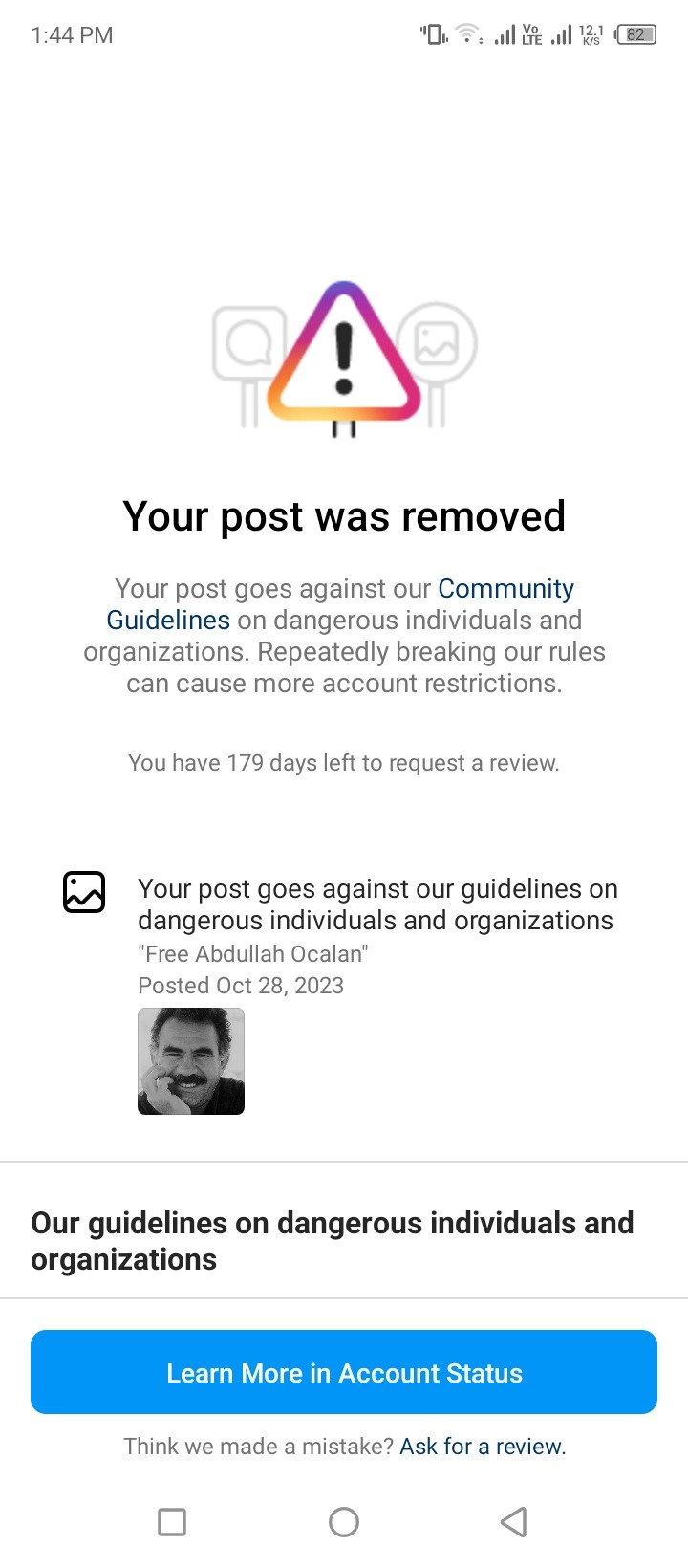
Once again $META has removed my post: FREE ABDULLAH OCALAN! Now Mark Zuckerberg and his team judges some people and rights as dangerous and that the fight for Kurds should not be on their sites. Meta Platforms are sowing seeds of FAILURE and it's coming SOON.
0 notes
Text
Why is the world ignoring the revolutionary Kurds in Syria?
Amid the Syrian warzone a democratic experiment is being stamped into the ground by Isis. That the wider world is unaware is a scandal
In 1937, my father volunteered to fight in the International Brigades in defence of the Spanish Republic. A would-be fascist coup had been temporarily halted by a worker’s uprising, spearheaded by anarchists and socialists, and in much of Spain a genuine social revolution ensued, leading to whole cities under directly democratic management, industries under worker control, and the radical empowerment of women.
Spanish revolutionaries hoped to create a vision of a free society that the entire world might follow. Instead, world powers declared a policy of “non-intervention” and maintained a rigorous blockade on the republic, even after Hitler and Mussolini, ostensible signatories, began pouring in troops and weapons to reinforce the fascist side. The result was years of civil war that ended with the suppression of the revolution and some of a bloody century’s bloodiest massacres.
I never thought I would, in my own lifetime, see the same thing happen again. Obviously, no historical event ever really happens twice. There are a thousand differences between what happened in Spain in 1936 and what is happening in Rojava, the three largely Kurdish provinces of northern Syria, today. But some of the similarities are so striking, and so distressing, that I feel it’s incumbent on me, as someone who grew up in a family whose politics were in many ways defined by the Spanish revolution, to say: we cannot let it end the same way again.
The autonomous region of Rojava, as it exists today, is one of few bright spots – albeit a very bright one – to emerge from the tragedy of the Syrian revolution. Having driven out agents of the Assad regime in 2011, and despite the hostility of almost all of its neighbours, Rojava has not only maintained its independence, but is a remarkable democratic experiment. Popular assemblies have been created as the ultimate decision-making bodies, councils selected with careful ethnic balance (in each municipality, for instance, the top three officers have to include one Kurd, one Arab and one Assyrian or Armenian Christian, and at least one of the three has to be a woman), there are women’s and youth councils, and, in a remarkable echo of the armed Mujeres Libres (Free Women) of Spain, a feminist army, the “YJA Star” militia (the “Union of Free Women”, the star here referring to the ancient Mesopotamian goddess Ishtar), that has carried out a large proportion of the combat operations against the forces of Islamic State.
How can something like this happen and still be almost entirely ignored by the international community, even, largely, by the International left? Mainly, it seems, because the Rojavan revolutionary party, the PYD, works in alliance with Turkey’s Kurdish Worker’s Party (PKK), a Marxist guerilla movement that has since the 1970s been engaged in a long war against the Turkish state. Nato, the US and EU officially classify them as a “terrorist” organisation. Meanwhile, leftists largely write them off as Stalinists.
But, in fact, the PKK itself is no longer anything remotely like the old, top-down Leninist party it once was. Its own internal evolution, and the intellectual conversion of its own founder, Abdullah Ocalan, held in a Turkish island prison since 1999, have led it to entirely change its aims and tactics.
The PKK has declared that it no longer even seeks to create a Kurdish state. Instead, inspired in part by the vision of social ecologist and anarchist Murray Bookchin, it has adopted the vision of “libertarian municipalism”, calling for Kurds to create free, self-governing communities, based on principles of direct democracy, that would then come together across national borders – that it is hoped would over time become increasingly meaningless. In this way, they proposed, the Kurdish struggle could become a model for a wordwide movement towards genuine democracy, co-operative economy, and the gradual dissolution of the bureaucratic nation-state.
Since 2005 the PKK, inspired by the strategy of the Zapatista rebels in Chiapas, declared a unilateral ceasefire with the Turkish state and began concentrating their efforts in developing democratic structures in the territories they already controlled. Some have questioned how serious all this really is. Clearly, authoritarian elements remain. But what has happened in Rojava, where the Syrian revolution gave Kurdish radicals the chance to carry out such experiments in a large, contiguous territory, suggests this is anything but window dressing. Councils, assemblies and popular militias have been formed, regime property has been turned over to worker-managed co-operatives – and all despite continual attacks by the extreme rightwing forces of Isis. The results meet any definition of a social revolution. In the Middle East, at least, these efforts have been noticed: particularly after PKK and Rojava forces intervened to successfully fight their way through Isis territory in Iraq to rescue thousands of Yezidi refugees trapped on Mount Sinjar after the local peshmerga fled the field. These actions were widely celebrated in the region, but remarkably received almost no notice in the European or North American press.
Now, Isis has returned, with scores of US-made tanks and heavy artillery taken from Iraqi forces, to take revenge against many of those same revolutionary militias in Kobane, declaring their intention to massacre and enslave – yes, literally enslave – the entire civilian population. Meanwhile, the Turkish army stands at the border preventing reinforcements or ammunition from reaching the defenders, and US planes buzz overhead making occasional, symbolic, pinprick strikes – apparently, just to be able to say that it did not do nothing as a group it claims to be at war with crushes defenders of one of the world’s great democratic experiments.
If there is a parallel today to Franco’s superficially devout, murderous Falangists, who would it be but Isis? If there is a parallel to the Mujeres Libres of Spain, who could it be but the courageous women defending the barricades in Kobane? Is the world – and this time most scandalously of all, the international left – really going to be complicit in letting history repeat itself?
1 note
·
View note
Photo
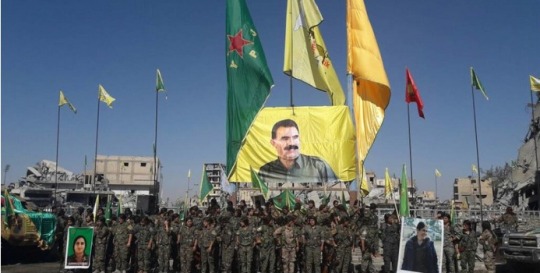
#CorpMedia #Idiocracy #Oligarchs #MegaBanks vs #Union #Occupy #NoDAPL #BLM #SDF #DACA #MeToo #Humanity #DemExit #FeelTheBern
YPG/YPJ fighters tell what Öcalan means to them [UPDATES]
https://anfenglish.com/news/ypg-ypj-fighters-tell-what-Oecalan-means-to-them-22851
Fighters from the YPG and YPJ explained the importance of Abdullah Öcalan, his ideas in their struggle for freedom, and for the liberation of Raqqa from ISIS...

RELATED UPDATE: Rojava: A Practical Example of Ecosocialism?
https://www.resilience.org/stories/2019-08-12/rojava-a-practical-example-of-ecosocialism/
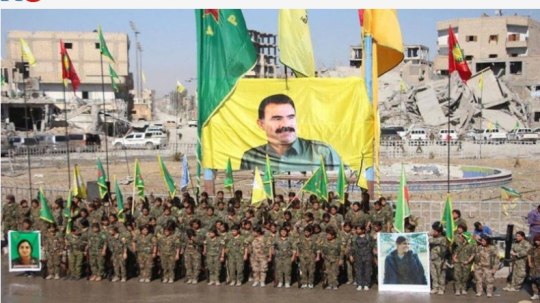
RELATED UPDATE: PKK leader jailed in Turkey sends message to Arab tribes in northeast Syria
https://www.kurdistan24.net/en/story/20512-PKK-leader-jailed-in-Turkey-sends-message-to-Arab-tribes-in-northeast-Syria

RELATED UPDATE: Kurdish Women's Protection Unit: YPJ, the fierce all-women force which fought to eliminate Islamic State
https://www.wionews.com/photos/kurdish-womens-protection-unit-ypj-the-fierce-fighting-force-which-fought-to-eliminate-islamic-state-258130#us-soldier-wears-ypj-badge-258118

RELATED UPDATE: YPJ, YPG fighters: We to struggle till liberating the leader physically
http://www.hawarnews.com/en/haber/ypj-ypg-fighters-we-to-struggle-till-liberating-the-leader-physically-h22931.html

RELATED UPDATE: YPJ, YPG fighters pledged to follow Ocalan approach
http://www.hawarnews.com/en/haber/ypj-ypg-fighters-pledged-to-follow-ocalan-approach-h27090.html

RELATED UPDATE: The Clintons Are Making a TV Show About Female Kurdish Fighters. That’s Absurd.
https://jacobinmag.com/2021/01/hillary-chelsea-clinton-tv-show-kurdish-fighters-ypj

RELATED UPDATE: The disgraceful spectacle of Hillary Clinton’s YPJ mini-series
https://morningstaronline.co.uk/article/f/disgraceful-spectacle-hillary-clintons-ypj-mini-series
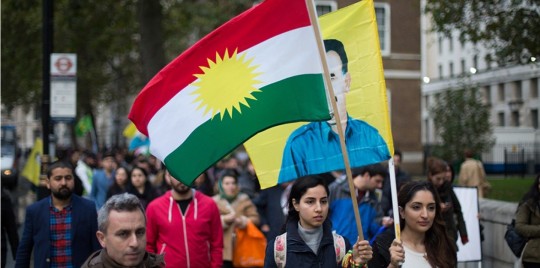
RELATED UPDATE: End 23 years of unjust and inhumane imprisonment
https://morningstaronline.co.uk/article/f/end-23-years-unjust-and-inhumane-imprisonment-freedom-abdullah-ocalan-now

RELATED UPDATE: Newroz Day 2022: From Kawa to Ocalan resistance continues
http://www.hawarnews.com/en/haber/newroz-day-2022-from-kawa-to-ocalan-resistance-continues-h29667.html
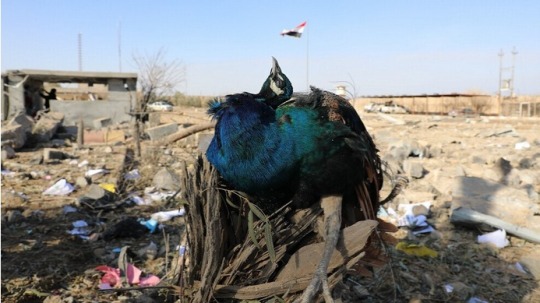
RELATED UPDATE: TEV-DEM: Yazidis must be protected from the threat of genocide
https://anfenglishmobile.com/kurdistan/tev-dem-yazidis-must-be-protected-from-the-threat-of-genocide-59413

RELATED UPDATE: Kurds protest against Turkish offensive in France and Canada
https://anfenglishmobile.com/news/kurds-protest-against-turkish-offensive-in-france-and-canada-59534
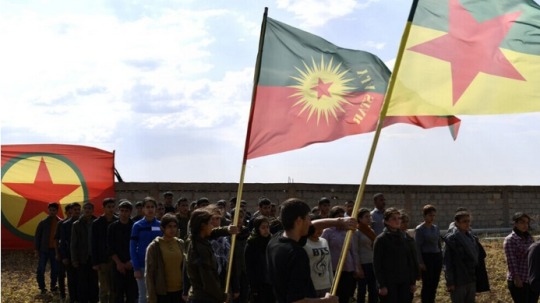
RELATED UPDATE: 50 young people from Rojava join the guerrilla ranks
https://anfenglishmobile.com/kurdistan/50-young-people-from-rojava-join-the-guerrilla-ranks-59866
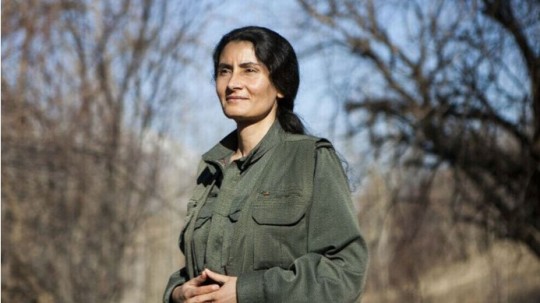
RELATED UPDATE: Besê Hozat: A coalition led by HDP will democratize Turkey and lead it to a free and just future
https://anfenglishmobile.com/kurdistan/bese-hozat-a-coalition-led-by-hdp-will-democratize-turkey-and-lead-it-to-a-free-and-just-future-59878
0 notes
Text
Socialist Strategy in Rojava
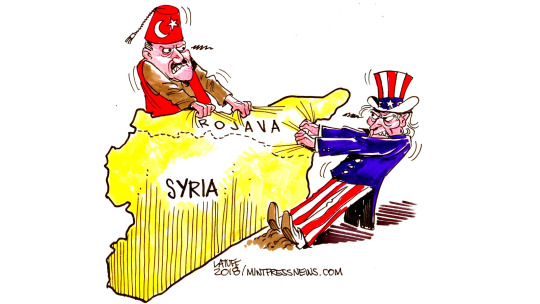
Socialist hegemony has taken hold in Rojava, where the legacy of Abdullah Ocalan unities a community of people around the central ideology of democratic confederalism. Ocalan is the old-fashioned Marxist-Leninist leader, that after his imprisonment, told people to begin to think for themselves, began reading libertarian socialist philosophy such as Murray Bookchin, and has while imprisoned started an intellectual project to work towards developing a theory of direct democracy for Rojava. Rojava functions based on a multi-party system, with a few parties promoting minority issues, and the rest touting libertarian socialism as their ideology, in the fashion of Ocalan’s theory of democratic confederalism (in accordance to the constitution of Rojava). How does a peoples overcome the ideological struggle to create a uniform ideology by which to organize society? This is an example of “organic centralism”. Rojava has seen an authentic women’s liberation movement in the midst of region where women’s rights have not been championed over the past century. Rojava has been able to establish socialist hegemony by abolishing capitalism through an economy where production is controlled by the workers and have maintained a self-sustaining economy producing wheat on a massive scale, for example.
The classical concept of cultural hegemony (i.e. Gramsci) doesn’t apply to Rojava because it is post-capitalist. All of Marxism is from the point of view of the proletariat being exploited by the ruling class, ideology is seen as a false consciousness, hegemony is seen as domination by a ruling class, but ultimately it is the idea of class that separates the exploited from the exploiters. If Rojava can be seen as a successful attempt at a classless society, with the collectivization of production, a structure of direct democracy, and justice delegated to citizens councils, a lack of prisons except housing enemies of the revolution, only a truly anarchist outlook on political philosophy must be rendered to describe the state of politics that is happening in this revolution. The idea in theory is that society must be in a state of permanent revolution, continually organizing into people’s assemblies and making decisions. Undoubtedly, Murray Bookchin took inspiration from Peter Kropotkin while formulating his theories of political philosophy. Unlike Marxism which lead to the school of critical theory focused on the critique of the state-form, much of anarchist philosophy deals with the theory of stateless democracy. Karl Marx’s Capital showed capitalism and its absurdity, but Peter Kropotkin’s The Conquest of Bread really laid out the blueprint for an anarcho-communist society. While both are helpful in the critique of capitalism, and while in today’s technological reality, Marx’s Capital may be more relevant to politics. Still, Kropotkin concerned himself with the most basic questions, how will people feed themselves? How will housing be organized? Where will the clothing people wear come from? These basic questions at the heart of survival are truly ideological questions as Kropotkin demonstrates. Marx’s theory of surplus value for example may be the justification for such a revolution in the organization of industry to take place, but Kropotkin’s “state of nature” approach envisions what a society would actually look like based on the voluntary collectivization of labor. Bookchin in theorizing communalism, uses both approaches in both his critique of capitalism and his constructive building of a new social order and what that would look like. Bookchin takes a very critical outlook against all fellow leftist ideologies including Marxism-Leninism, Trotskyism, and anarcho-syndicalism. He follows in the tradition of anarcho-communism in his invention of communalism, and uses the people’s council as the basic unit of government. Rather than the labor union being the principal unit of government as in anarcho-syndicalism, the people’s council is chosen by Bookchin. The first component of communalism, as theorized by Bookchin, is libertarian municipalism, or the advent of the free commune being led by the people’s council. The second is confederalism, where the people’s council elects representatives to confederate to higher-up assemblies of government, namely the free confederation of communes.
0 notes